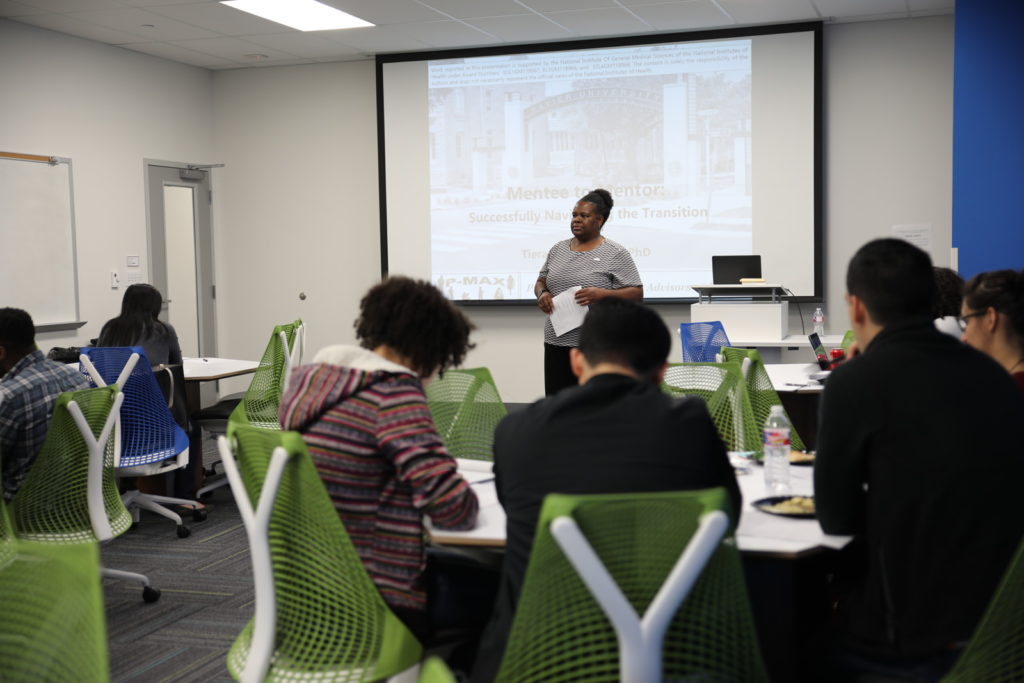6 Tips to Successfully Navigating the Transition From Mentee to Mentor

Dr. Tiera Coston from Xavier University of Louisiana spoke to graduate students and postdoctoral fellows on Nov. 2 about tips to transition from mentee to mentor.
“You will be mentored all your life,” she said. “Right now, your role as a mentor is increasing more and more.”
During the workshop, graduate students and postdocs reflected on the different roles that research mentors play and which ones they considered most important.
“If you are not intentional about the way you are going to mentor, you will end up doing it the way you were mentored,” she explained. “A mentoring relationship is a two-way street. Your mentor benefits a lot; they give a lot, but they also gain a lot.”
Dr. Coston reflected back on a memory she had as a graduate student when her mentor came in with a pile of manuscripts and asked her to review them.
“I was shocked. I didn’t feel like I had the experience to review them, but I will always remember what she said to me at that moment. She said ‘you know more about the topic than me at this point in your research career’ and true enough, she was right. After reviewing those manuscripts, I realized how much I knowledge I had gained in my field.”
Mentee Tips
1. Communicate clearly and set expectations early, even in the interview stage
Whether you’re a graduate student or a postdoc, it is important for you to know what you want at the interview stage. Do you want this research position because it is in a city that allows you to be close to your spouse or significant other? Do you want to join this lab because the PI has a stellar reputation in the field? Are you primarily interested in learning or enhancing a particular skill set? Do you want a job with flexibility to pick up your kids after work? If you can clearly communicate what your goals and expectations are, you have a much better chance of finding a mentor and research position that are a good fit.
2. Be active in the mentoring relationship
Maintaining a positive relationship with your research mentor is very important and can be achieved through frequent, open, and candid communication. Think about what is working well and what’s not working well in the mentor-mentee relationships. Discuss this frequently.
3. Be self-aware and maintain focus.
In research, mentors can often ask you to work on ‘tangent projects’ by saying “wouldn’t it be cool if we explored XYZ?”. These ‘tangents’ can be good because they could lead you in new, productive directions. However, they can also lead down a rabbit hole where your dissertation work has less focus and the side project has more. It is important for you to be self-aware and make an informed decision about whether these tangent projects can be potentially beneficial or just something exciting to explore without much promise of a productive outcome.
Mentor Tips
1. Write a mentoring philosophy
A mentoring philosophy is a statement that explains and justifies the way you approach personal and professional relationships with students as you guide their development into professionals. In your philosophy, include definitions of mentor, mentee, and learning, your view of the mentee and mentor role, goals and expectations of the relationship and mentoring methods and evaluations. It is great to be able to periodically reflect back on your mentoring philosophy and see how you evolve as a mentor.
2. Invest in the time to mentor.
If you are not ready to invest the time commitment to mentor, then don’t do it. A good mentor will know what’s important to and for their mentee and always help them stay focused on the goals they are trying to reach. All of this takes a great time commitment.
3. Know yourself before you mentor.
It is important to know your strengths, but it is also essential to know those areas that challenge you and pay attention on how to address those challenges. You also need to be open to the fact that each mentee comes with their own experiences and culture. No two mentees are the same, and it is very important to acknowledge that there are things you may not understand but are open to learning.
 This article was written by Charlotte Anthony, marketing specialist at the Graduate School of Biomedical Sciences at UT Health San Antonio.
This article was written by Charlotte Anthony, marketing specialist at the Graduate School of Biomedical Sciences at UT Health San Antonio.
